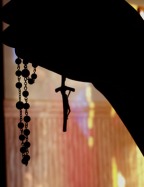"To find that our own faith is so deeply in accord with others is an affirming experience. Without departing from our own tradition, therefore, we can learn from others how to enhance our particular pursuit of the empathic life."
-Karen Armstrong, The Great Transformation
Why am I Catholic? Somehow I have found myself contemplating this questions in the middle of a classroom for the past four months. I enrolled in this class with the usual mindset of the average college senior. We would look at the facts and figures of other religions in other cultures, I could pull off a decent grade, graduate, and then probably forget it all a month later. The thing this class had going for it was the professor. I heard he was pretty cool and wanted to get in on the excitement while I could. Religion in Culture started out as just another class in my college experience, but ended up being a personal experience of its own.
On the first day of class our professor asked us what we thought the definition of religion was. Our definition ended up being two pages of letters, words, parts of sentences, and metaphors. And throughout the semester we added many more complex definitions. Many definitions existed, and all were somehow right. This perplexing idea of defining religion made me think about defining myself.
I didn't want to let my religious beliefs define who I was. But if I didn't have beliefs to define who I was, then what was defining me? And if having no beliefs at all is a belief in itself, then where do I stand? At the end of the course, our professor let us in on an article he had written. I quote him saying, "Participation is not a choice. Our only choice is how we participate. Silence is itself participation, and sometimes it speaks volumes we do not intend." Having no beliefs is a belief just as not participating is participating. By not taking a stand for my beliefs I was not taking a stand for myself.
I learned to be open to other beliefs, but at the same time I learned to embrace my own. Instead of looking at differences and questioning whose beliefs are correct, we can look at similarities and connect with others. In this way, we are learning about others and we are also learning about ourselves. Participating in the quest of life means believing in something-even if it is nothing. The question is, how will you participate?
The Rosary

Many religions-Christianity, Islam, Buddhism, Hinduism, and more-use prayer beads as pathways of meditation and spirituality.
This site is dedicated to provide insightful information about the Rosary and towards the appreciation of prayer beads in all religions.
I began researching the Rosary to learn more about my own religion and convey the message of the Rosary to a foreign audience.
When I started my research, I didn't expect prayer beads to be a major connection between vastly different religions. This connection is an "affirming experience" and teaches us appreciation for religious differences.
